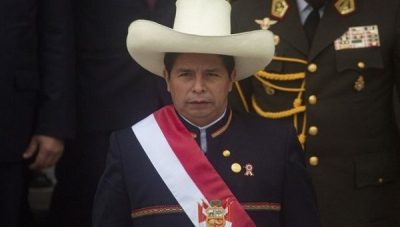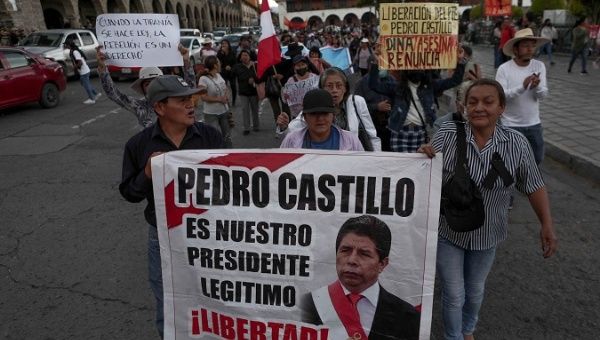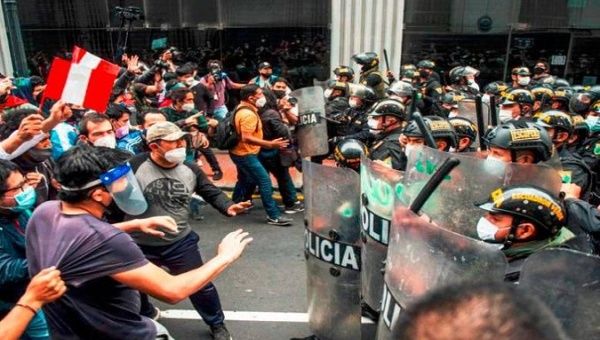White House Deploys Troops to Bolster Right-wing Coup Regime in Peru
As unrest continues the United States-backed government of Dina Boluarte commits atrocious human rights violations

All Global Research articles can be read in 51 languages by activating the Translate Website button below the author’s name.
To receive Global Research’s Daily Newsletter (selected articles), click here.
Click the share button above to email/forward this article to your friends and colleagues. Follow us on Instagram and Twitter and subscribe to our Telegram Channel. Feel free to repost and share widely Global Research articles.
***
In early December of 2022, the socialist president of Peru, Pedro Castillo, was overthrown in a political coup engineered by the conservative-dominated Congress and immediately thrown into prison.
Vice-President Dina Boluarte was installed as the new leader having received the endorsement of the military and the police.
Simultaneously, the United States administration of President Joe Biden recognized the new political order making it appear as if the coup had the full support of the oval office in Washington, D.C. Since December, the people of Peru have engaged in mass demonstrations, strikes and blockades of the mining areas aimed at forcing the resignation of Boluarte and the holding of new elections.
In recent weeks the announcement that the Pentagon would deploy approximately 1,100 troops to Peru in what is described as Resolute Sentinel 2023, has been met with opposition inside the country and throughout the regions of South America, Central America and the Caribbean. The official explanation from the White House regarding the sending of troops to Peru is that they will carry out training exercises among the military and police.
This decision by the Biden administration provides further proof that the U.S. capitalist class views Peru as being significant in their efforts to maintain economic hegemony of the mineral-rich state. Over the course of the last seven months since the right-wing coup, at least 66 people have been killed as a result of military and police actions against demonstrations and strikes.
On a legal basis, the ongoing harassment by the Boluarte regime of opposition figures in Peru obviously indicates that the U.S. has given authorization for the blatant violations of fundamental civil and human rights in the country. Numerous organizations involved in monitoring repressive governance in Latin America have cited the coup regime in Lima with gross abuses of union organizers, political activists, former elected officials and rank-and-file workers and farmers.
Although the former President Castillo has been denied a proper hearing involving the charges of rebellion against him, on July 6, the Peruvian State Attorney General Daniel Soria requested that the Supreme Court of Justice seize the assets of the socialist leader. Castillo is a former rural school teacher and union leader. Castillo’s assets were three properties in a rural area of Chota and a home in the Tacabamba district. See this.
What’s at Stake for the U.S. in Peru?
The former President Castillo’s rise to power in 2021 represented the aspirations of the workers and peasants who have been exploited for centuries by the landed oligarchy allied with multinational extractive corporations which reap enormous profits from the resources and labor of the people. Historically, colonial and semi-colonial territories and nations are designed to extend the profit-making capacity of the capitalist class based in the western industrialized states.
Peru supporters of ousted President Pedro Castillo who remains in prison (Source: Abayomi Azikiwe)
Peru has vast reservoirs of mineral deposits which are essential in the global capitalist system of production and distribution. The country is the second largest producer of copper, silver and zinc. It is the third leading producer of lead and the fourth supplier of tin and molybdenum. In addition, Peru is the eighth largest producer of gold internationally, and the number one source in Latin America.
According to one source on the known mineral resources existing in the country and its relationship to the pre-colonial period says:
“Peru’s mining industry has always played a vital role in the nation’s economy. Mining dated back to pre-Inca times and thrived through the Inca, colonial, and republican periods, contributing to much of the country’s development. As a critical component of its economic development, mining accounts for 10% of Peru’s GDP and 60% of its exports, making minerals its leading export sector…. In addition, Peru has a wealth of non-metallic resources, such as phosphates, manganese, and uranium. In the last ten years, high production rates have attracted USD $60 billion in inbound investment into Peru’s mining sector. However, future mining projects set to move into development within the next few years are worth an estimated of over US$55 billion.” (See this)
Peru is dependent upon Foreign Direct Investment (FDI) as the principal engine of economic growth domestically. The leading players in FDI in the country are the U.S., the United Kingdom, the Netherlands, Spain, Brazil and Chile. Since the 1990s under the presidency of Alberto Fujimori, laws were drafted to facilitate external control over large sectors of the national economy.
The utilization of mining as a major source of wealth generation has increased the GDP of Peru and the profitability of the corporations which control the extractive industry. Nonetheless, there have been negative outcomes related to the environmental damage done by mining.
Labor unions and peasant organizations representing the Indigenous communities have resisted the encroachment by the multinational corporations and their super-exploitation of the land and labor of the majority within society. Since the coup in December, people living in the southern mining and tourist areas have used direct action aimed at emphasizing their demands for a democratic government based upon the interests of the workers and farmers. (See this)
The same news website quoted above highlights the corporate-friendly character of the Peruvian state:
“Peru’s strength as a secure investment destination is also reflected in its international integration. It has signed over 30 Agreements for the Promotion and Reciprocal Protection of Investments and Agreements to Avoid Double Taxation And Prevent Tax Evasion with Mexico, Canada, Brazil, and Japan, among other major economies. Peru is also a member of the Asia-Pacific Economic Cooperation (APEC), the Trans-Pacific Partnership (TP), and the EU Multi Party Trade Agreement. Furthermore, Peru is constantly improving its business climate to strengthen its economy. In collaboration with other public and private entities, the Ministry of Foreign Affairs, through the Directorate-General of Economic Promotion and its network of 137 diplomatic and consular missions, works tirelessly to promote investment in mining projects, focusing on social profitability and respect for the environment and surrounding communities.”
However, the reference to social profitability and environmental concerns are obviously thrown in for international public consumption. The response of the Peruvian conservative-dominated Congress and administration to the workers and farmers indicate that it is the U.S. and the western-controlled mining firms which have the primary consideration inside the country.
Strengthening the Repressive Neo-Colonial Apparatus
Consequently, the deployment of Pentagon special forces and security trainers to Peru illustrates the role of the U.S. in perpetuating the existing exploitative system prevailing in the country. Such a move being initiated to bolster an administration responsible for the staging of an imperialist-engineered coup, carrying out widespread false arrests, legal framings and the injuring and killing of its citizens should have been vigorously challenged within the U.S. Congress and media.
The only real attempt to prevent the deployment of U.S. troops to Peru was a challenge mounted by New York City Democratic Congresswoman Alexandra Ocasio-Cortez when she submitted an addendum to the National Defense Authorization Act (NDAA) which prohibits the funding and joint military cooperation with governments where human rights violations have occurred. Unfortunately, the effort failed to garner adequate support within the House of Representatives which is dominated by the Republican Party. (See this)
Even the minority Democratic members of the House and the majority within the Senate have not challenged the rising Pentagon budget. Moreover, both parties have not objected to the stated $115 billion commitment to continuing the NATO proxy war in Ukraine against the Russian Federation.
Biden’s coordination of a military-directed coup regime in Peru maintains the long existing foreign policy of the U.S. in Latin America. Washington does not want the consolidation of the leftward trend in national and international politics in the region.
Peru police repress democratic movement (Source: Abayomi Azikiwe)
Cuba, Venezuela, Honduras, Bolivia, Brazil, Nicaragua, among other states and mass movements are setting examples of what can be achieved through pursuing an independent domestic and foreign policy. The Republic of Mexico has expressed an interest in joining the Brazil, Russia, India, China and South Africa (BRICS) Summit scheduled to meet from August 22-24 in the Republic of South Africa, the annual host. President Cyril Ramaphosa of South Africa has extended an invitation to all other 54 African Union (AU) member-states to attend the BRICS gathering. Many within the U.S. ruling class and Congress are bitterly opposed to the Mexican President Andres Manuel Lopez Obrador (AMLO) and the Morena Party which has built its political base upon the notions of genuine independence and sovereignty from the U.S.
Threats of military intervention by the Pentagon against Mexico, under whatever pretext, should be categorically condemned by all progressive forces in the U.S. These military deployments are acts of desperation, as also holds true in regard to Peru.
It will not benefit the ruling class of the U.S. to expand the violent and unwarranted intervention in the internal affairs of states within Latin America. These efforts will result in a worsening social situation in the U.S., quickening the demise of the unjust and exploitative capitalist system.
*
Note to readers: Please click the share button above. Follow us on Instagram and Twitter and subscribe to our Telegram Channel. Feel free to repost and share widely Global Research articles.
Abayomi Azikiwe is the editor of the Pan-African News Wire. He is a regular contributor to Global Research.
Featured image is from Abayomi Azikiwe



